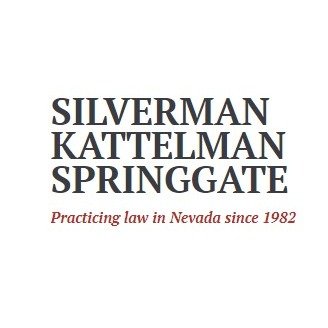Best Tax Increment Financing Lawyers in Nevada
Share your needs with us, get contacted by law firms.
Free. Takes 2 min.
Or refine your search by selecting a city:
List of the best lawyers in Nevada, United States
About Tax Increment Financing Law in Nevada, United States
Tax Increment Financing, or TIF, is a public financing method that Nevada municipalities and local governments can use to stimulate economic development and redevelopment in specific areas. Through TIF, increased property tax revenues that result from the rise in property values within a designated district are set aside to fund infrastructure improvements and other development projects. In Nevada, TIF works as a tool to revitalize underdeveloped or blighted areas and to help pay for public infrastructure that supports private investment, such as roads, utilities, and facilities.
Why You May Need a Lawyer
Navigating Tax Increment Financing in Nevada can be complex, given the involvement of multiple public and private stakeholders, specific statutory requirements, and potentially significant financial commitments. Seeking legal advice is recommended in several common situations:
- If you are a developer seeking to participate in a TIF project or seeking TIF funding for your development.
- If you are a property owner within a proposed or existing TIF district and are concerned about potential tax changes or impacts to your property.
- If you represent a municipality or local governing authority and are considering establishing a TIF district.
- If you need help with bond issuance, public-private partnership agreements, or negotiation of development agreements under TIF.
- If you want to challenge or support the creation or modification of a TIF district.
A lawyer can assist in ensuring compliance with Nevada state law, advising on project feasibility, drafting and reviewing legal documents, and representing clients throughout the public hearing and approval process.
Local Laws Overview
Tax Increment Financing in Nevada is governed primarily by Nevada Revised Statutes (NRS) Chapter 279, known as the Community Redevelopment Law. Key aspects of Nevada TIF laws include:
- Designation of TIF Districts: Local governments can designate certain areas as redevelopment districts. A detailed redevelopment plan must be prepared and adopted, often requiring public input and hearings.
- Increment Calculation: The "tax increment" is calculated based on the increase in assessed property values within the district after its creation.
- Use of Funds: Incremental revenues can be used for a range of public improvements, including infrastructure, environmental remediation, and public facilities. They cannot be used for general municipal expenses.
- Bond Financing: TIF revenues can be pledged to repay bonds issued to fund eligible redevelopment costs, providing upfront capital for large projects.
- Oversight and Reporting: Community redevelopment agencies must comply with annual reporting requirements and provide transparency on project outcomes and fund usage.
Nevada law sets strict requirements for public involvement, fiscal responsibility, and protection against misuse of public funds in TIF arrangements.
Frequently Asked Questions
What is Tax Increment Financing (TIF)?
Tax Increment Financing is a method used by local governments to finance public improvements by earmarking the future increase in property tax revenues from a designated district to fund those improvements.
Who can create a TIF district in Nevada?
City and county governments in Nevada are empowered by state law to establish TIF districts, usually through their redevelopment agencies.
What types of projects can be funded using TIF in Nevada?
TIF can be used for a variety of public development projects including infrastructure upgrades, transportation systems, public parks, and environmental clean-up within the redevelopment area.
How does TIF affect property taxes for individual property owners?
The base property tax assessment remains the same, but the increment generated by increased property values is allocated to the TIF fund instead of the general fund. Property tax rates themselves do not increase solely because of TIF.
Are there risks associated with TIF?
TIF can involve financial risks if projected increases in property values and tax revenues do not materialize, which might affect the ability to repay bonds or fund future improvements.
How long do TIF districts last in Nevada?
The lifespan of a TIF district is established in the redevelopment plan, but many last between 20 and 30 years or until the bonded debt is paid off.
Is public input required before establishing a TIF district?
Yes, public hearings and opportunity for community input are mandated before a TIF district is approved or altered. This ensures transparency and community involvement.
Can TIF districts be changed or terminated early?
TIF districts and their boundaries can be amended, and districts can be dissolved, through formal action and public processes as defined in the redevelopment plan and state law.
How is TIF different from other development financing tools?
Unlike general obligation bonds or direct subsidies, TIF specifically relies on new tax revenues generated within the district, rather than citywide taxes or funds, to support development projects.
Where can I find official information about TIF laws in Nevada?
Official information is published in Nevada Revised Statutes Chapter 279 and through local government redevelopment agencies.
Additional Resources
If you need more information or assistance related to Tax Increment Financing in Nevada, consider these resources:
- Nevada Attorney General's Office
- Nevada Department of Taxation
- Local city or county community redevelopment agencies
- Nevada League of Cities and Municipalities
- National Association of Development Organizations
You may also benefit from contacting local economic development offices for guidance specific to your city or county.
Next Steps
If you require legal assistance or have concerns related to Tax Increment Financing in Nevada, follow these steps:
- Gather all relevant information about your property, project, or interest in a TIF district, including any notifications or public documents you have received.
- Identify your specific questions or issues, such as participation in a TIF project, concerns over property taxes, or objections to a redevelopment plan.
- Contact a Nevada attorney who specializes in municipal, real estate, or public finance law with experience in TIF matters.
- Prepare to discuss your goals and concerns, and bring any relevant documentation to your first meeting.
- Follow your attorney's advice regarding negotiations, public hearings, or further legal proceedings to ensure that your interests are protected.
Taking early legal action can help you navigate the complex regulatory landscape of Tax Increment Financing and avoid unnecessary risks or misunderstandings.
Lawzana helps you find the best lawyers and law firms in Nevada through a curated and pre-screened list of qualified legal professionals. Our platform offers rankings and detailed profiles of attorneys and law firms, allowing you to compare based on practice areas, including Tax Increment Financing, experience, and client feedback.
Each profile includes a description of the firm's areas of practice, client reviews, team members and partners, year of establishment, spoken languages, office locations, contact information, social media presence, and any published articles or resources. Most firms on our platform speak English and are experienced in both local and international legal matters.
Get a quote from top-rated law firms in Nevada, United States — quickly, securely, and without unnecessary hassle.
Disclaimer:
The information provided on this page is for general informational purposes only and does not constitute legal advice. While we strive to ensure the accuracy and relevance of the content, legal information may change over time, and interpretations of the law can vary. You should always consult with a qualified legal professional for advice specific to your situation.
We disclaim all liability for actions taken or not taken based on the content of this page. If you believe any information is incorrect or outdated, please contact us, and we will review and update it where appropriate.
Browse tax increment financing law firms by city in Nevada
Refine your search by selecting a city.













